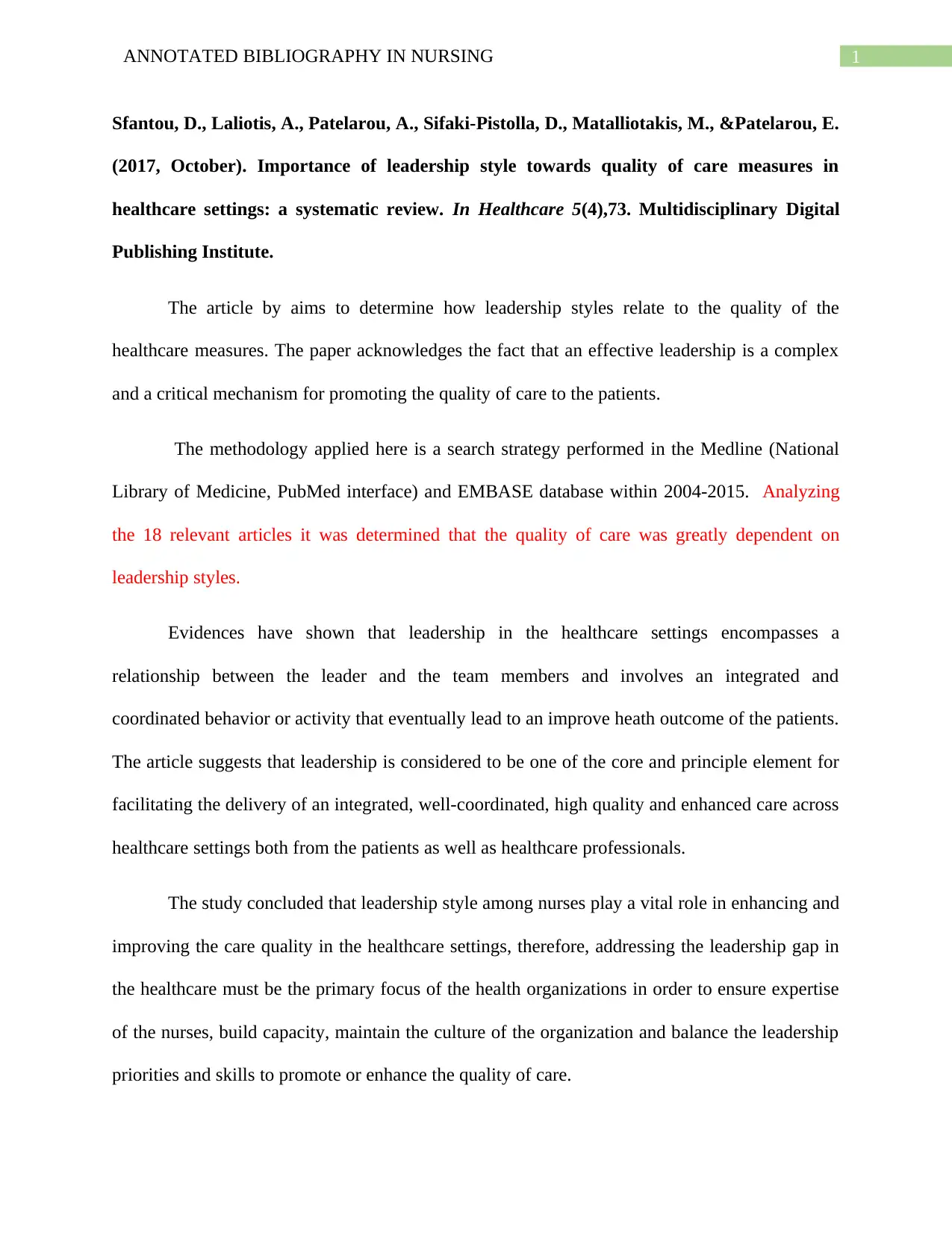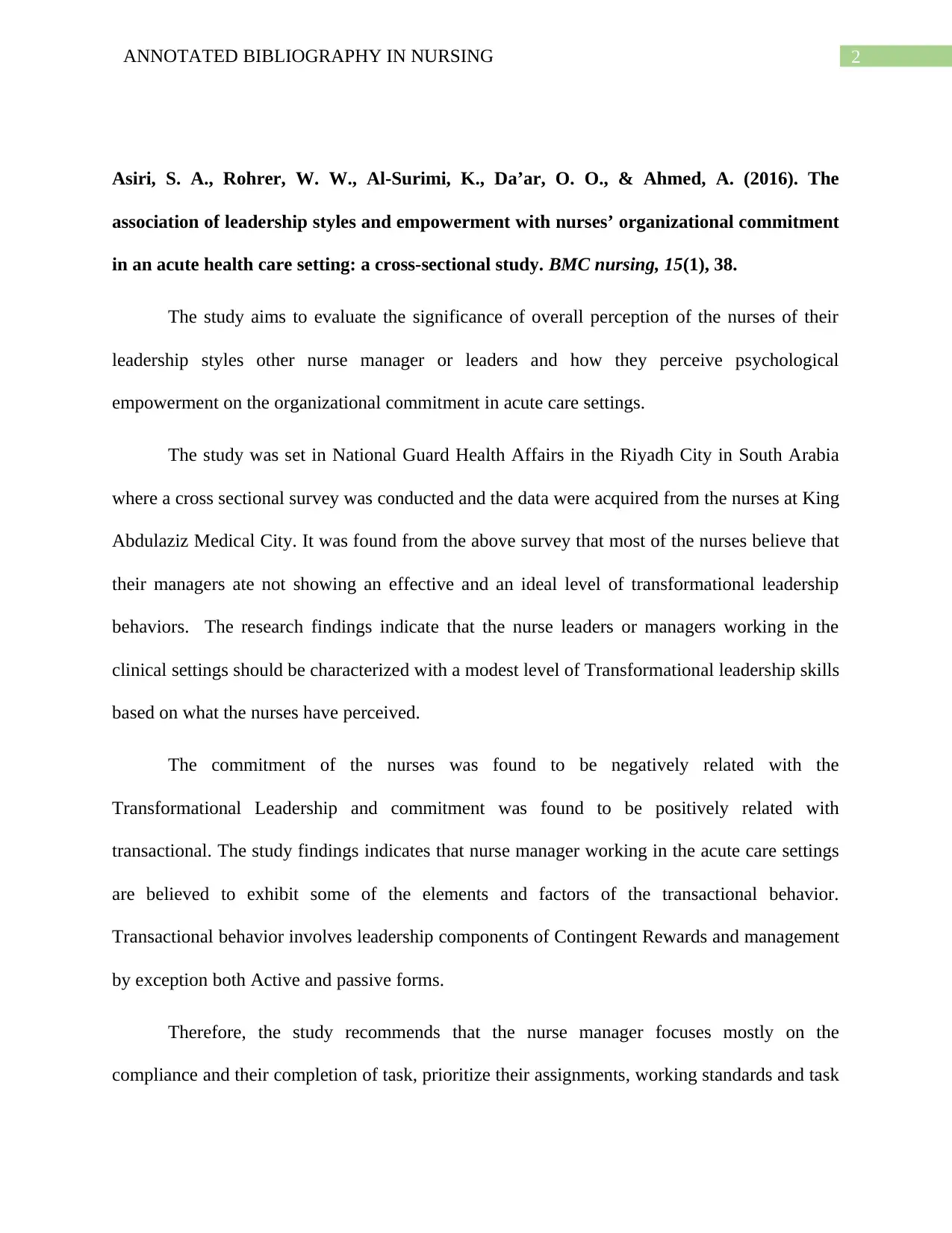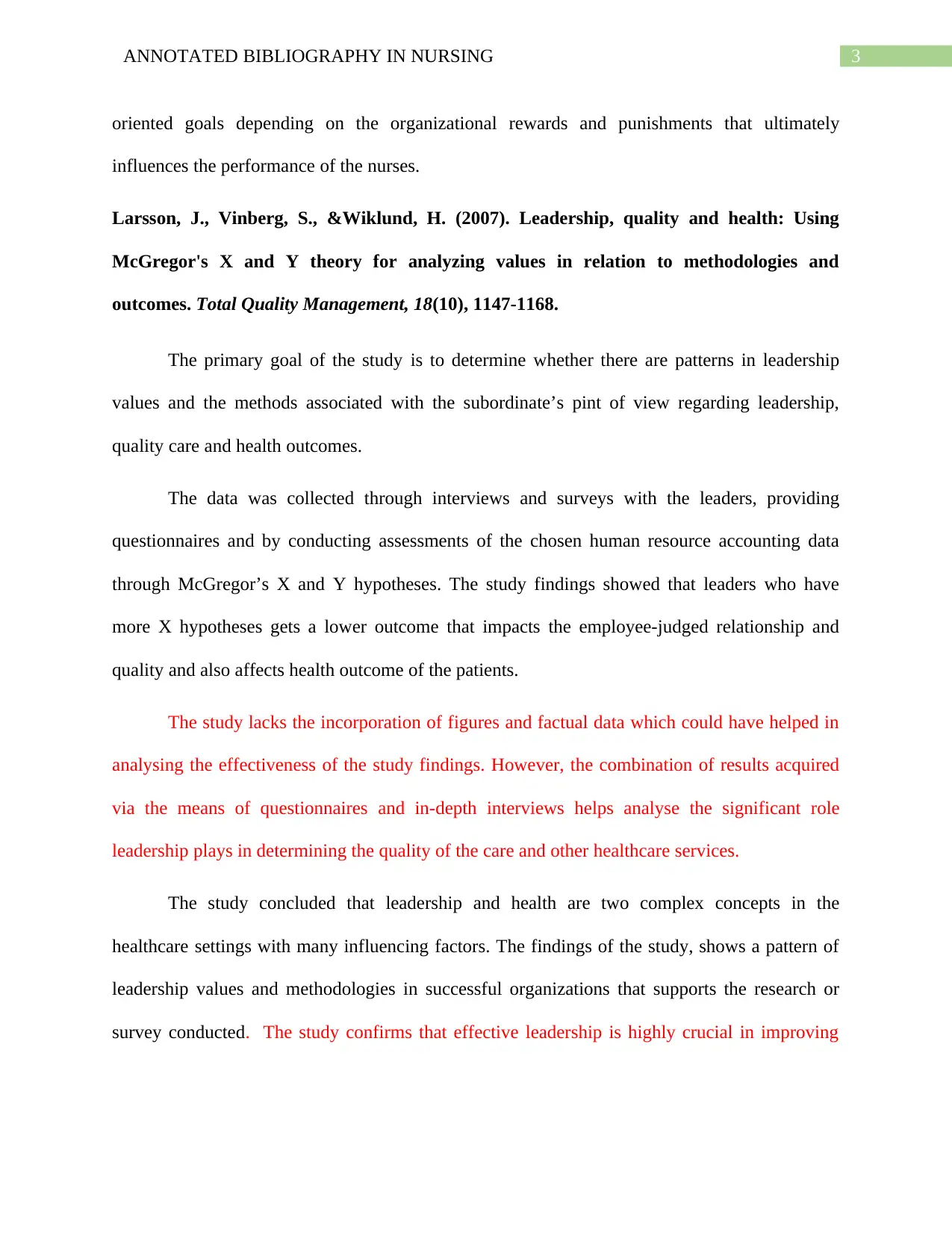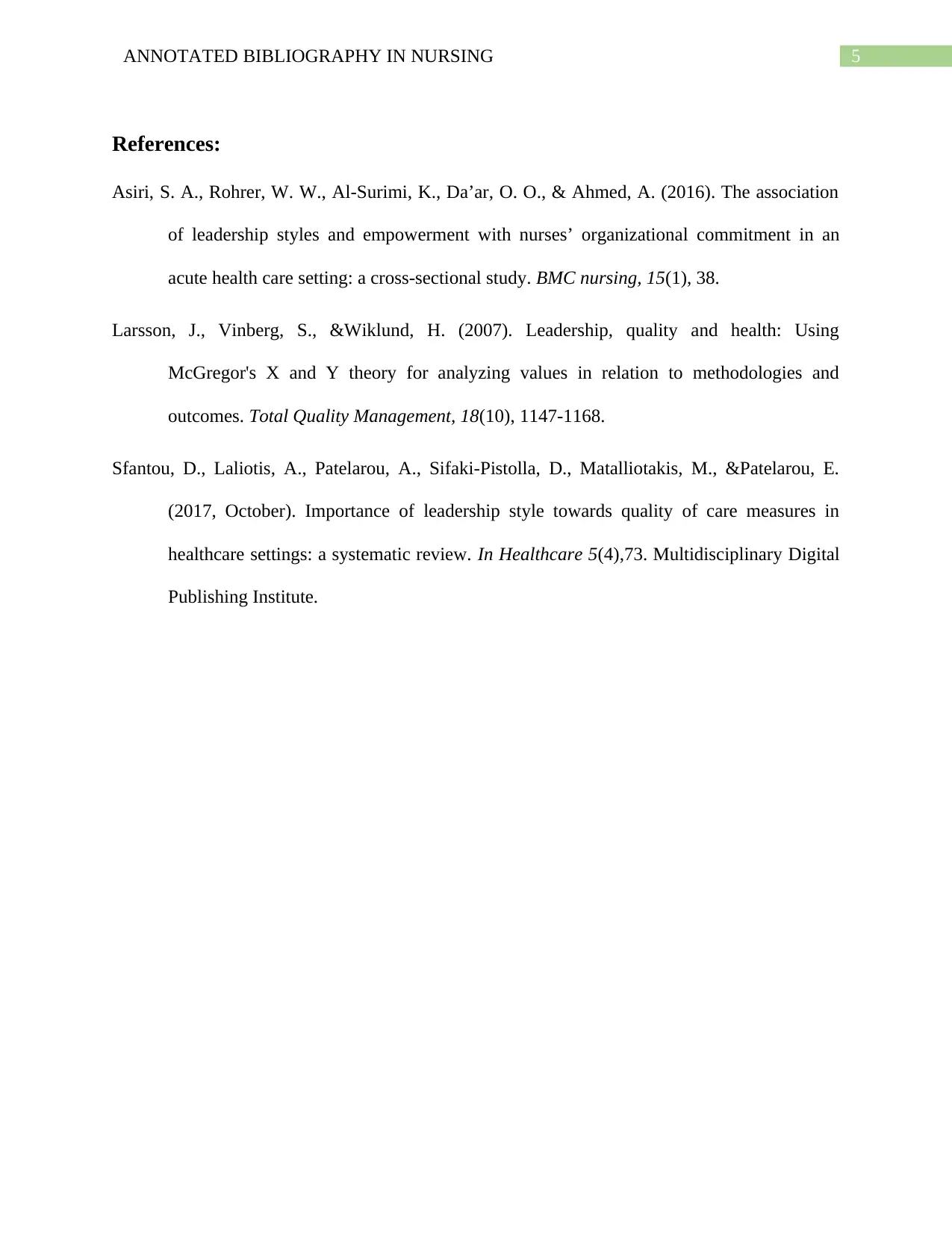Annotated Bibliography: Leadership Styles in Nursing Practice
VerifiedAdded on 2022/11/15
|6
|1136
|67
Annotated Bibliography
AI Summary
This annotated bibliography examines three scholarly articles focusing on nursing leadership styles and their impact on healthcare quality and organizational commitment. The first article, by Sfantou et al. (2017), reviews the importance of leadership styles in relation to quality of care measures, emphasizing the significance of effective leadership in improving patient outcomes. The second article, by Asiri et al. (2016), investigates the association between leadership styles, empowerment, and nurses' organizational commitment, highlighting the influence of transactional leadership behaviors in acute care settings. The third article, by Larsson et al. (2007), analyzes leadership values and methodologies using McGregor's X and Y theory, demonstrating the relationship between leadership approaches, employee perceptions, and quality of care. Each annotation includes a summary of the article's purpose, methodology, key findings, and conclusions, along with an analysis of the article's strengths and limitations and its relevance to nursing leadership and practice.

Running head: ANNOTATED BIBLIOGRAPHY IN NURSING
ANNOTATED BIBLIOGRAPHY IN NURSING
Name of the Student
Name of the University
Author Note
ANNOTATED BIBLIOGRAPHY IN NURSING
Name of the Student
Name of the University
Author Note
Paraphrase This Document
Need a fresh take? Get an instant paraphrase of this document with our AI Paraphraser

1ANNOTATED BIBLIOGRAPHY IN NURSING
Sfantou, D., Laliotis, A., Patelarou, A., Sifaki-Pistolla, D., Matalliotakis, M., &Patelarou, E.
(2017, October). Importance of leadership style towards quality of care measures in
healthcare settings: a systematic review. In Healthcare 5(4),73. Multidisciplinary Digital
Publishing Institute.
The article by aims to determine how leadership styles relate to the quality of the
healthcare measures. The paper acknowledges the fact that an effective leadership is a complex
and a critical mechanism for promoting the quality of care to the patients.
The methodology applied here is a search strategy performed in the Medline (National
Library of Medicine, PubMed interface) and EMBASE database within 2004-2015. Analyzing
the 18 relevant articles it was determined that the quality of care was greatly dependent on
leadership styles.
Evidences have shown that leadership in the healthcare settings encompasses a
relationship between the leader and the team members and involves an integrated and
coordinated behavior or activity that eventually lead to an improve heath outcome of the patients.
The article suggests that leadership is considered to be one of the core and principle element for
facilitating the delivery of an integrated, well-coordinated, high quality and enhanced care across
healthcare settings both from the patients as well as healthcare professionals.
The study concluded that leadership style among nurses play a vital role in enhancing and
improving the care quality in the healthcare settings, therefore, addressing the leadership gap in
the healthcare must be the primary focus of the health organizations in order to ensure expertise
of the nurses, build capacity, maintain the culture of the organization and balance the leadership
priorities and skills to promote or enhance the quality of care.
Sfantou, D., Laliotis, A., Patelarou, A., Sifaki-Pistolla, D., Matalliotakis, M., &Patelarou, E.
(2017, October). Importance of leadership style towards quality of care measures in
healthcare settings: a systematic review. In Healthcare 5(4),73. Multidisciplinary Digital
Publishing Institute.
The article by aims to determine how leadership styles relate to the quality of the
healthcare measures. The paper acknowledges the fact that an effective leadership is a complex
and a critical mechanism for promoting the quality of care to the patients.
The methodology applied here is a search strategy performed in the Medline (National
Library of Medicine, PubMed interface) and EMBASE database within 2004-2015. Analyzing
the 18 relevant articles it was determined that the quality of care was greatly dependent on
leadership styles.
Evidences have shown that leadership in the healthcare settings encompasses a
relationship between the leader and the team members and involves an integrated and
coordinated behavior or activity that eventually lead to an improve heath outcome of the patients.
The article suggests that leadership is considered to be one of the core and principle element for
facilitating the delivery of an integrated, well-coordinated, high quality and enhanced care across
healthcare settings both from the patients as well as healthcare professionals.
The study concluded that leadership style among nurses play a vital role in enhancing and
improving the care quality in the healthcare settings, therefore, addressing the leadership gap in
the healthcare must be the primary focus of the health organizations in order to ensure expertise
of the nurses, build capacity, maintain the culture of the organization and balance the leadership
priorities and skills to promote or enhance the quality of care.

2ANNOTATED BIBLIOGRAPHY IN NURSING
Asiri, S. A., Rohrer, W. W., Al-Surimi, K., Da’ar, O. O., & Ahmed, A. (2016). The
association of leadership styles and empowerment with nurses’ organizational commitment
in an acute health care setting: a cross-sectional study. BMC nursing, 15(1), 38.
The study aims to evaluate the significance of overall perception of the nurses of their
leadership styles other nurse manager or leaders and how they perceive psychological
empowerment on the organizational commitment in acute care settings.
The study was set in National Guard Health Affairs in the Riyadh City in South Arabia
where a cross sectional survey was conducted and the data were acquired from the nurses at King
Abdulaziz Medical City. It was found from the above survey that most of the nurses believe that
their managers ate not showing an effective and an ideal level of transformational leadership
behaviors. The research findings indicate that the nurse leaders or managers working in the
clinical settings should be characterized with a modest level of Transformational leadership skills
based on what the nurses have perceived.
The commitment of the nurses was found to be negatively related with the
Transformational Leadership and commitment was found to be positively related with
transactional. The study findings indicates that nurse manager working in the acute care settings
are believed to exhibit some of the elements and factors of the transactional behavior.
Transactional behavior involves leadership components of Contingent Rewards and management
by exception both Active and passive forms.
Therefore, the study recommends that the nurse manager focuses mostly on the
compliance and their completion of task, prioritize their assignments, working standards and task
Asiri, S. A., Rohrer, W. W., Al-Surimi, K., Da’ar, O. O., & Ahmed, A. (2016). The
association of leadership styles and empowerment with nurses’ organizational commitment
in an acute health care setting: a cross-sectional study. BMC nursing, 15(1), 38.
The study aims to evaluate the significance of overall perception of the nurses of their
leadership styles other nurse manager or leaders and how they perceive psychological
empowerment on the organizational commitment in acute care settings.
The study was set in National Guard Health Affairs in the Riyadh City in South Arabia
where a cross sectional survey was conducted and the data were acquired from the nurses at King
Abdulaziz Medical City. It was found from the above survey that most of the nurses believe that
their managers ate not showing an effective and an ideal level of transformational leadership
behaviors. The research findings indicate that the nurse leaders or managers working in the
clinical settings should be characterized with a modest level of Transformational leadership skills
based on what the nurses have perceived.
The commitment of the nurses was found to be negatively related with the
Transformational Leadership and commitment was found to be positively related with
transactional. The study findings indicates that nurse manager working in the acute care settings
are believed to exhibit some of the elements and factors of the transactional behavior.
Transactional behavior involves leadership components of Contingent Rewards and management
by exception both Active and passive forms.
Therefore, the study recommends that the nurse manager focuses mostly on the
compliance and their completion of task, prioritize their assignments, working standards and task
⊘ This is a preview!⊘
Do you want full access?
Subscribe today to unlock all pages.

Trusted by 1+ million students worldwide

3ANNOTATED BIBLIOGRAPHY IN NURSING
oriented goals depending on the organizational rewards and punishments that ultimately
influences the performance of the nurses.
Larsson, J., Vinberg, S., &Wiklund, H. (2007). Leadership, quality and health: Using
McGregor's X and Y theory for analyzing values in relation to methodologies and
outcomes. Total Quality Management, 18(10), 1147-1168.
The primary goal of the study is to determine whether there are patterns in leadership
values and the methods associated with the subordinate’s pint of view regarding leadership,
quality care and health outcomes.
The data was collected through interviews and surveys with the leaders, providing
questionnaires and by conducting assessments of the chosen human resource accounting data
through McGregor’s X and Y hypotheses. The study findings showed that leaders who have
more X hypotheses gets a lower outcome that impacts the employee-judged relationship and
quality and also affects health outcome of the patients.
The study lacks the incorporation of figures and factual data which could have helped in
analysing the effectiveness of the study findings. However, the combination of results acquired
via the means of questionnaires and in-depth interviews helps analyse the significant role
leadership plays in determining the quality of the care and other healthcare services.
The study concluded that leadership and health are two complex concepts in the
healthcare settings with many influencing factors. The findings of the study, shows a pattern of
leadership values and methodologies in successful organizations that supports the research or
survey conducted. The study confirms that effective leadership is highly crucial in improving
oriented goals depending on the organizational rewards and punishments that ultimately
influences the performance of the nurses.
Larsson, J., Vinberg, S., &Wiklund, H. (2007). Leadership, quality and health: Using
McGregor's X and Y theory for analyzing values in relation to methodologies and
outcomes. Total Quality Management, 18(10), 1147-1168.
The primary goal of the study is to determine whether there are patterns in leadership
values and the methods associated with the subordinate’s pint of view regarding leadership,
quality care and health outcomes.
The data was collected through interviews and surveys with the leaders, providing
questionnaires and by conducting assessments of the chosen human resource accounting data
through McGregor’s X and Y hypotheses. The study findings showed that leaders who have
more X hypotheses gets a lower outcome that impacts the employee-judged relationship and
quality and also affects health outcome of the patients.
The study lacks the incorporation of figures and factual data which could have helped in
analysing the effectiveness of the study findings. However, the combination of results acquired
via the means of questionnaires and in-depth interviews helps analyse the significant role
leadership plays in determining the quality of the care and other healthcare services.
The study concluded that leadership and health are two complex concepts in the
healthcare settings with many influencing factors. The findings of the study, shows a pattern of
leadership values and methodologies in successful organizations that supports the research or
survey conducted. The study confirms that effective leadership is highly crucial in improving
Paraphrase This Document
Need a fresh take? Get an instant paraphrase of this document with our AI Paraphraser

4ANNOTATED BIBLIOGRAPHY IN NURSING
the promoting healthy working environment as well as help in acquiring quality work forms the
employees, which will directly contribute to the success of the organization.
the promoting healthy working environment as well as help in acquiring quality work forms the
employees, which will directly contribute to the success of the organization.

5ANNOTATED BIBLIOGRAPHY IN NURSING
References:
Asiri, S. A., Rohrer, W. W., Al-Surimi, K., Da’ar, O. O., & Ahmed, A. (2016). The association
of leadership styles and empowerment with nurses’ organizational commitment in an
acute health care setting: a cross-sectional study. BMC nursing, 15(1), 38.
Larsson, J., Vinberg, S., &Wiklund, H. (2007). Leadership, quality and health: Using
McGregor's X and Y theory for analyzing values in relation to methodologies and
outcomes. Total Quality Management, 18(10), 1147-1168.
Sfantou, D., Laliotis, A., Patelarou, A., Sifaki-Pistolla, D., Matalliotakis, M., &Patelarou, E.
(2017, October). Importance of leadership style towards quality of care measures in
healthcare settings: a systematic review. In Healthcare 5(4),73. Multidisciplinary Digital
Publishing Institute.
References:
Asiri, S. A., Rohrer, W. W., Al-Surimi, K., Da’ar, O. O., & Ahmed, A. (2016). The association
of leadership styles and empowerment with nurses’ organizational commitment in an
acute health care setting: a cross-sectional study. BMC nursing, 15(1), 38.
Larsson, J., Vinberg, S., &Wiklund, H. (2007). Leadership, quality and health: Using
McGregor's X and Y theory for analyzing values in relation to methodologies and
outcomes. Total Quality Management, 18(10), 1147-1168.
Sfantou, D., Laliotis, A., Patelarou, A., Sifaki-Pistolla, D., Matalliotakis, M., &Patelarou, E.
(2017, October). Importance of leadership style towards quality of care measures in
healthcare settings: a systematic review. In Healthcare 5(4),73. Multidisciplinary Digital
Publishing Institute.
⊘ This is a preview!⊘
Do you want full access?
Subscribe today to unlock all pages.

Trusted by 1+ million students worldwide
1 out of 6
Related Documents
Your All-in-One AI-Powered Toolkit for Academic Success.
+13062052269
info@desklib.com
Available 24*7 on WhatsApp / Email
![[object Object]](/_next/static/media/star-bottom.7253800d.svg)
Unlock your academic potential
Copyright © 2020–2026 A2Z Services. All Rights Reserved. Developed and managed by ZUCOL.



